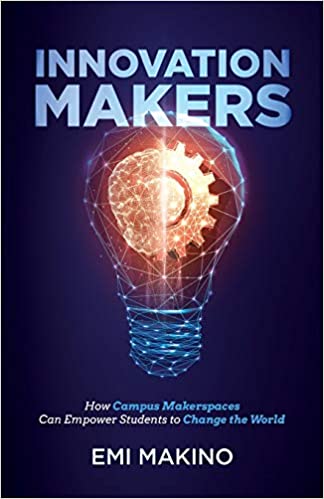
The importance of large-scale innovation has been underscored recently by the Endless Frontier Act, currently under consideration in the United States Congress. It’s been written about recently in The Economist, and in a Washington Post opinion piece by columnist George S. Will. Smaller-scale innovation is important too, as demonstrated in the recent book Innovation Makers: How Campus Makerspaces Can Empower Students to Change the World, by the Japanese author Emi Makino, an Associate Professor at Hiroshima University. The concept of campus makerspaces is pretty much under-the-radar, and the book should help readers get a better sense of the opportunity these spaces provide for students and faculty, especially when more people return to college campuses worldwide.
The book itself exists because of an innovative process: it grew out of a Georgetown University course Emi took (via Zoom) on content entrepreneurship, taught by adjunct professor and serial entrepreneur Eric Koester. The writing, publication and fundraising (in this case through Indiegogo) of the book was the whole point of the course. Coincidentally, years earlier, Emi was a student at Georgetown, during one of her various stints living in the United States.
I’ve known Emi since 2009, when I met her during the Drucker School’s events marking the 100th anniversary of Peter Drucker’s birth. She was then an MBA student, and later received her Ph.D. at the school. In the book, she describes her varied, worldwide career, in which before she became an academic, she was a journalist and a translator. It was in the latter role that I initially met her: I introduced myself after witnessing her excellent translation of a talk by Masatoshi Ito, Drucker’s longtime friend, and the founder and honorary chairman of Japan’s Seven & i Holdings Co., Ltd.
Drucker followers will find Emi’s book to be particularly interesting. Although she came to campus after Peter’s death, she was mentored by his wife of 68 years, the late Doris Drucker, who is written about extensively in the book. Emi also studied with the famous Mihaly Csikszentmihalyi (best known for the concept of flow), when he was teaching at the Drucker School. “One of the things I learned in Csikszentmihalyi’s class,” Emi writes, “is that the structure of work is highly compatible with the conditions that enable the flow experience.”
Emi and I will (separately) be contributors to the Global Peter Drucker Forum’s upcoming virtual event, A Day of Drucker. She will be the Chair of the session “How Management Ideas Have Impact: The Case of Drucker in Japan.” One of her panelists, Drucker School MBA Katsutoshi Fujita, Founder and CEO of Project Initiative Co., and author of Real Management Learned at the Drucker School, is another longtime friend of mine.
In 2013, Emi accepted my invitation to write a guest passage in my second book, Create Your Future the Peter Drucker Way. In this post, she answers my questions about her career, the makerspaces phenomenon, and its implications, especially for the role of libraries in furthering innovation.
In your teaching and research, what are the commonalities/relationships you have observed between makerspaces/physically making things (whether on campuses or elsewhere) and major trends in recent years of invisible/intangible assets and intellectual property?
The internet has democratized the production and distribution of products and services that can be digitized, such as entertainment, design, and software. One no longer needs to make significant capital investments in order to gain access to the means of production. Even kids can produce and broadcast professional-quality videos with just a smartphone. However, the democratization of manufacturing is only just emerging. It is coming, but not quite as quickly as some had anticipated. Making and distributing physical things is challenging and still quite expensive despite the promise of digital fabrication. Once the makerspace equivalent of Amazon’s AWS emerges, that’s when the digital tsunami will hit the old guards in manufacturing.
Within the book you mention a number of cities around the world in which you have lived/worked/studied/taught. Has this diverse experience had an impact on the way you write, teach, and conduct research?
Yes. Living and working in so many places has helped me to better appreciate the complexities in the world around us. It has also helped me to question what is, and to continuously strive towards a better future.
Makerspaces have become important in libraries. What role do you see in the future that libraries (public, academic, or corporate) could play to strengthen innovation and entrepreneurship, and education about these subjects?
Libraries will play a critical role in democratizing manufacturing. Books were an essential source of empowerment as we transformed into a knowledge-based society in the 20th century. But knowledge alone cannot produce physical products. Unlike bits, atoms are subject to the law of physics. The “last mile” in the manufacturing supply chain has yet to be connected digitally to homes. That’s why libraries are so important. The physical act of making things is a powerful way to learn and practice entrepreneurship. The more people have access to equipment, the greater the chance for innovative solutions to wicked problems to emerge.
